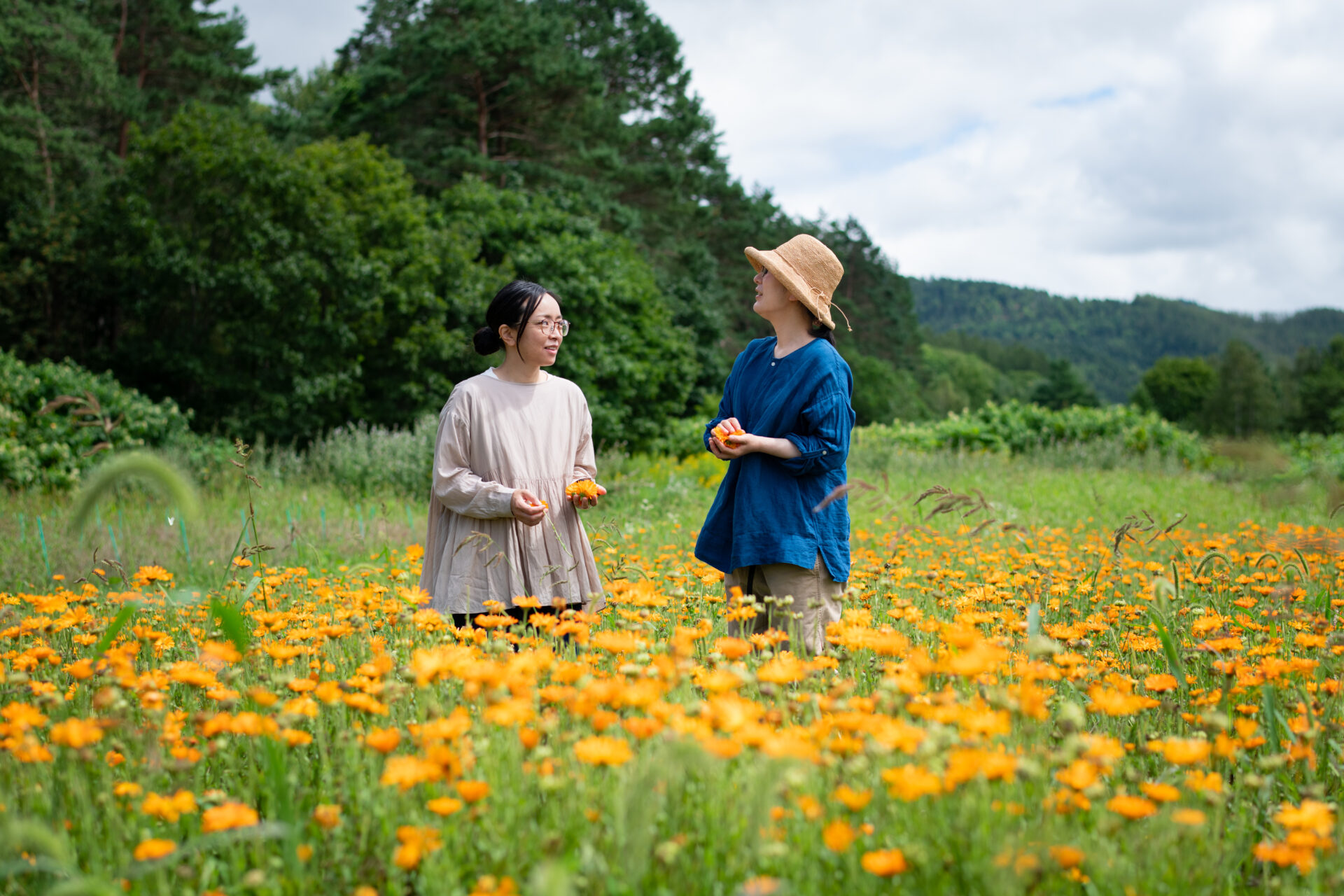In August 2022, the calendula flowers were in full bloom at craft cosmetics maker SORRY KOUBOU’s herb garden in Shimokawa Town, Hokkaido.
These flowers have excellent antiseptic and anti-inflammatory properties, and they have been used for medicinal purposes since the time Cleopatra walked in ancient Egypt.
Kaori Yamada (pictured left) and Sachiko Komatsu (pictured right) were happily chatting in the garden surrounded by these sweet flowers.
These two women started SORRY KOUBOU in 2017. They cleared and cultivated this land that was overgrown with weeds, and now they organically grow herbs and flowers such as German chamomile, chicory, and huckleberry.
They pick the herbs themselves and make handmade herbal tinctures. Herbal tinctures are concentrated liquids made by extracting plant water and oil in alcohol.
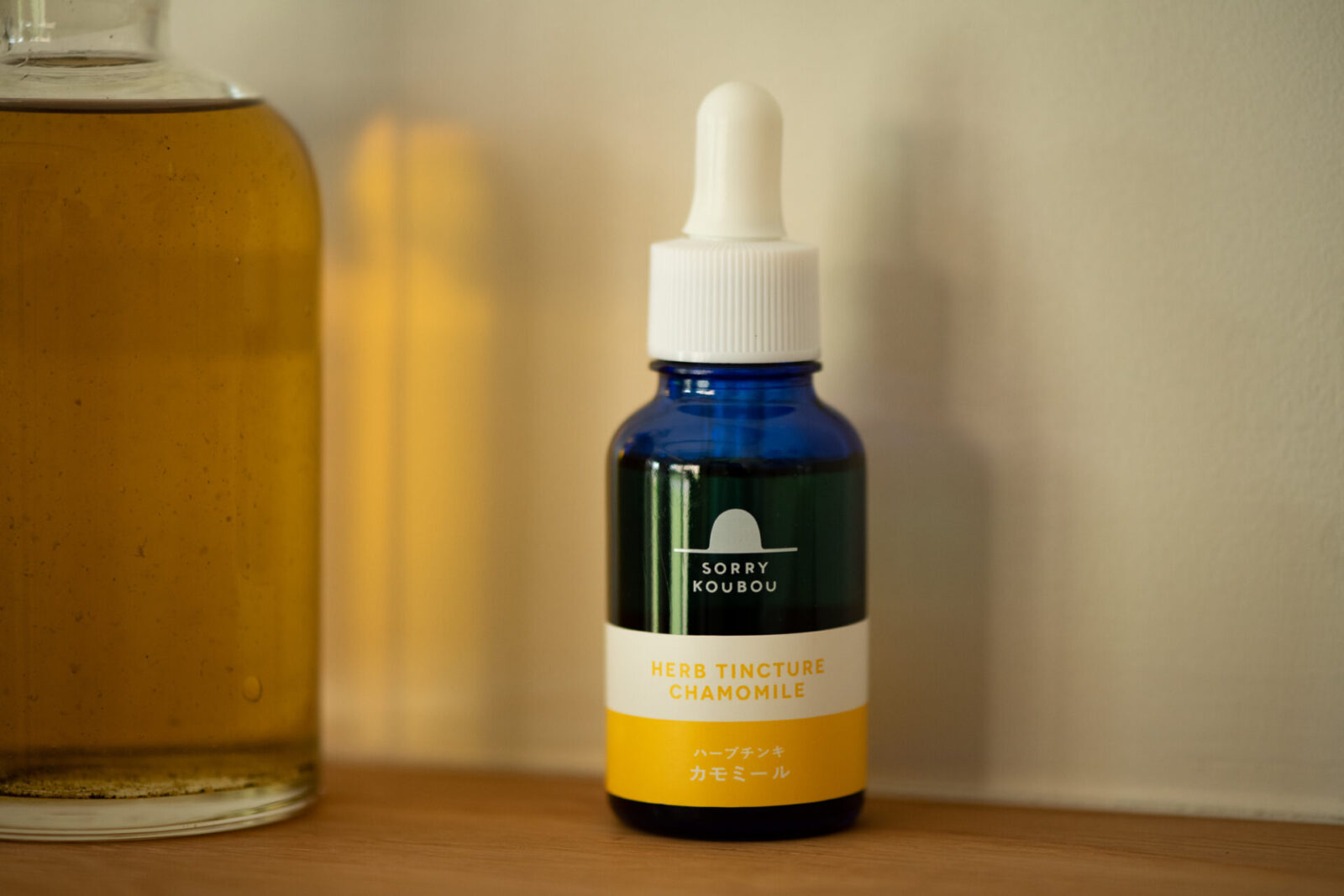
By mixing herbal tincture with water and glycerin, which is a moisturizer, you can make your own facial toner that is free of preservatives. You can also add the tincture to a toner or moisturizer that you use everyday, which will add fragrance and the herb’s respective active ingredients into your beauty routine.
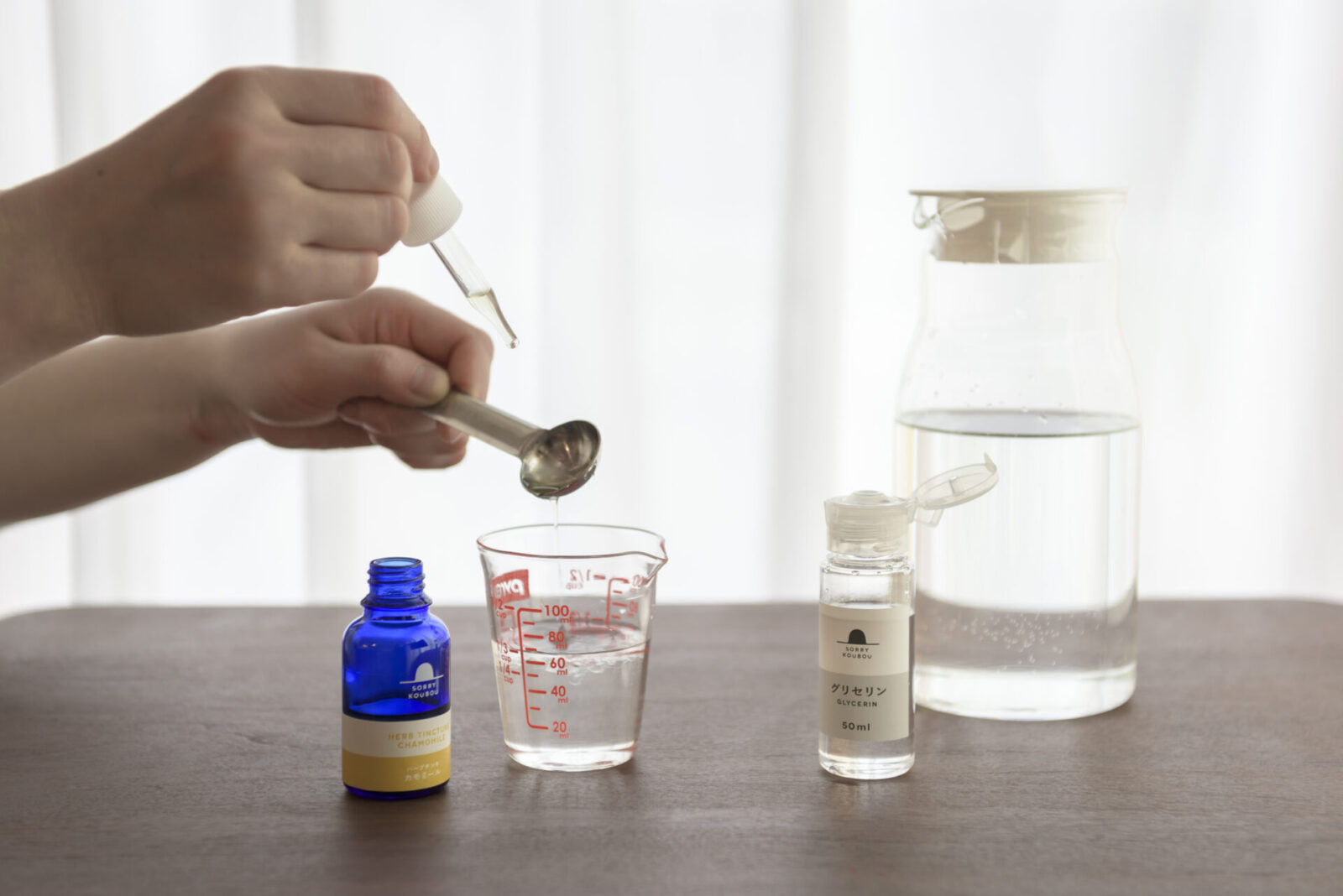
SORRY KOUBOU’s herbal tincture is not only popular but has gained a high reputation via word of mouth. Some reviews include, “It is great to use all over the body, including as a hair oil,” “It is safe to use for the whole family because it comes from natural ingredients” and “It is not as expensive as buying high end toners.”
Komatsu is a certified cosmetics manufacturing specialist. She smiles as she explains, “We use ethanol that is made from domestically grown sugarcane which is safe to drink, so our products can also be used as a mouthwash.”
These two women came from completely different backgrounds, growing up in different places and working different jobs. How did they end up making cosmetics together in Hokkaido? We asked them about their journey and why they chose to produce herbal tincture, a new cosmetic alternative to regular toners.
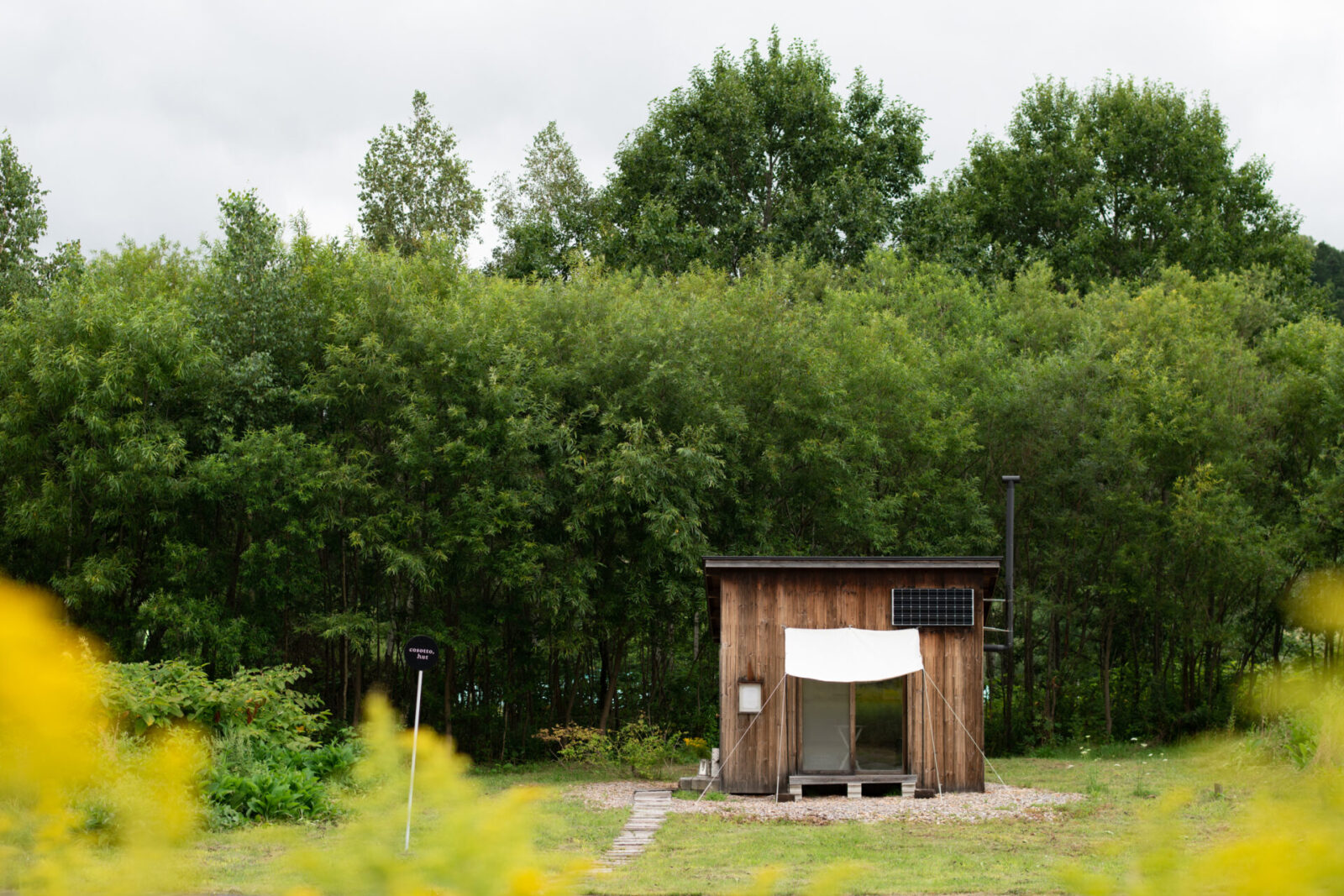
An alternative to buying skin toner
The SORRY KOUBOU produces a wide range of products, including nine different herbal tinctures, soaps, moisturizing oils, lip balm and herbal tea.
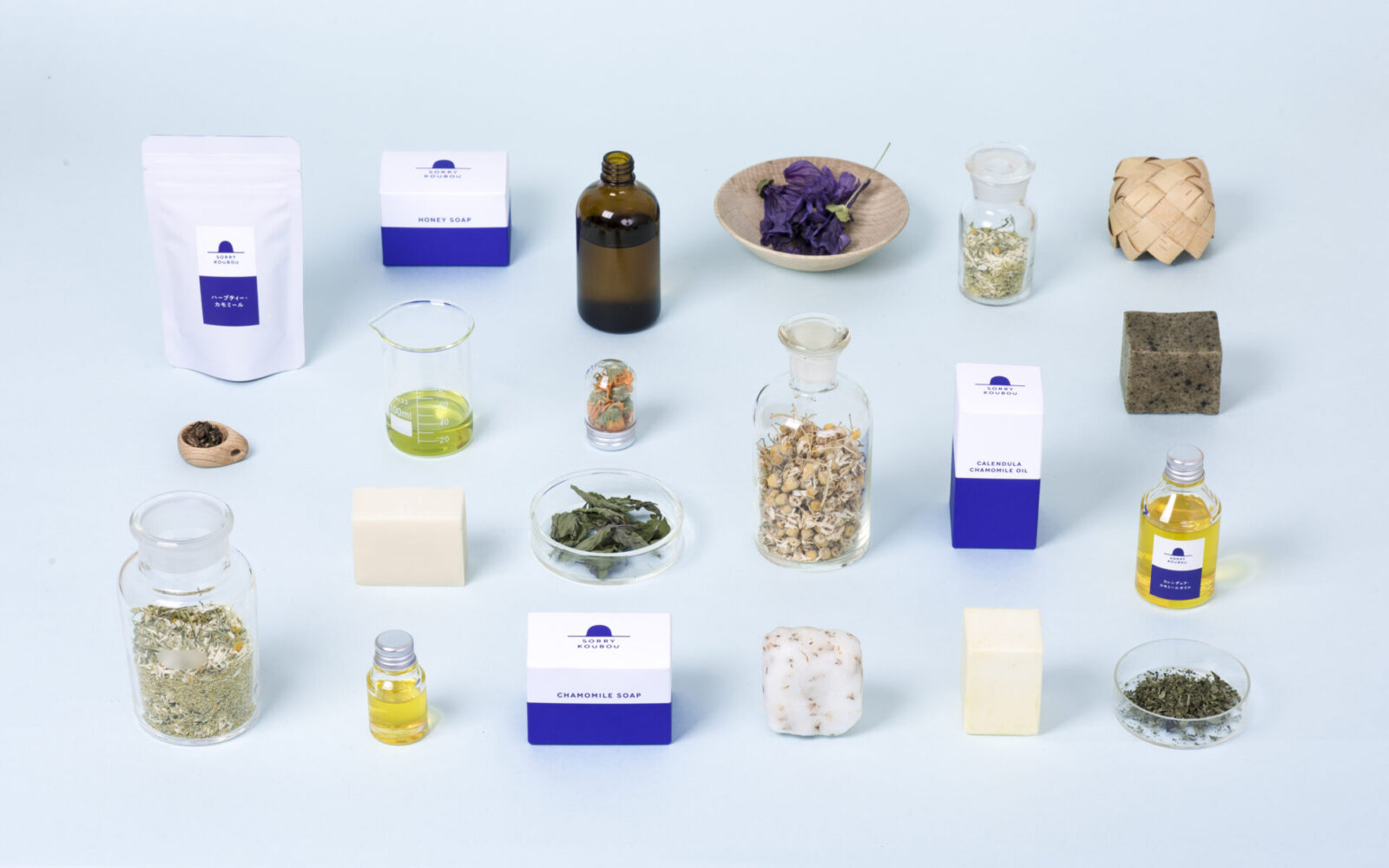
They sell their products on their online shop and at the “cosotto,hut”. They also travel to various markets in Hokkaido to sell their products and hold workshops to promote the use of herbal tinctures.
Herbal tinctures are plant extracts, so rather than using them on their own, they are added to other toners and moisturizers, or mixed with glycerin and water to make your own lotion.
In their workshops, they explain the active ingredients of the different herbs and participants can choose the tinctures according to their personal taste or based on how they are feeling that day.
Komatsu explains, “Toner is 90 percent water, so for products on the market, preservatives must be added in order to distribute them. Although it takes a little bit of time and effort, we promote making your own toner. This way the toner can be made without preservatives and it is safe for all ages to use and can be shared in the whole family.”
She says that for most customers, making their own cosmetics is a first time experience and many people enjoy it.
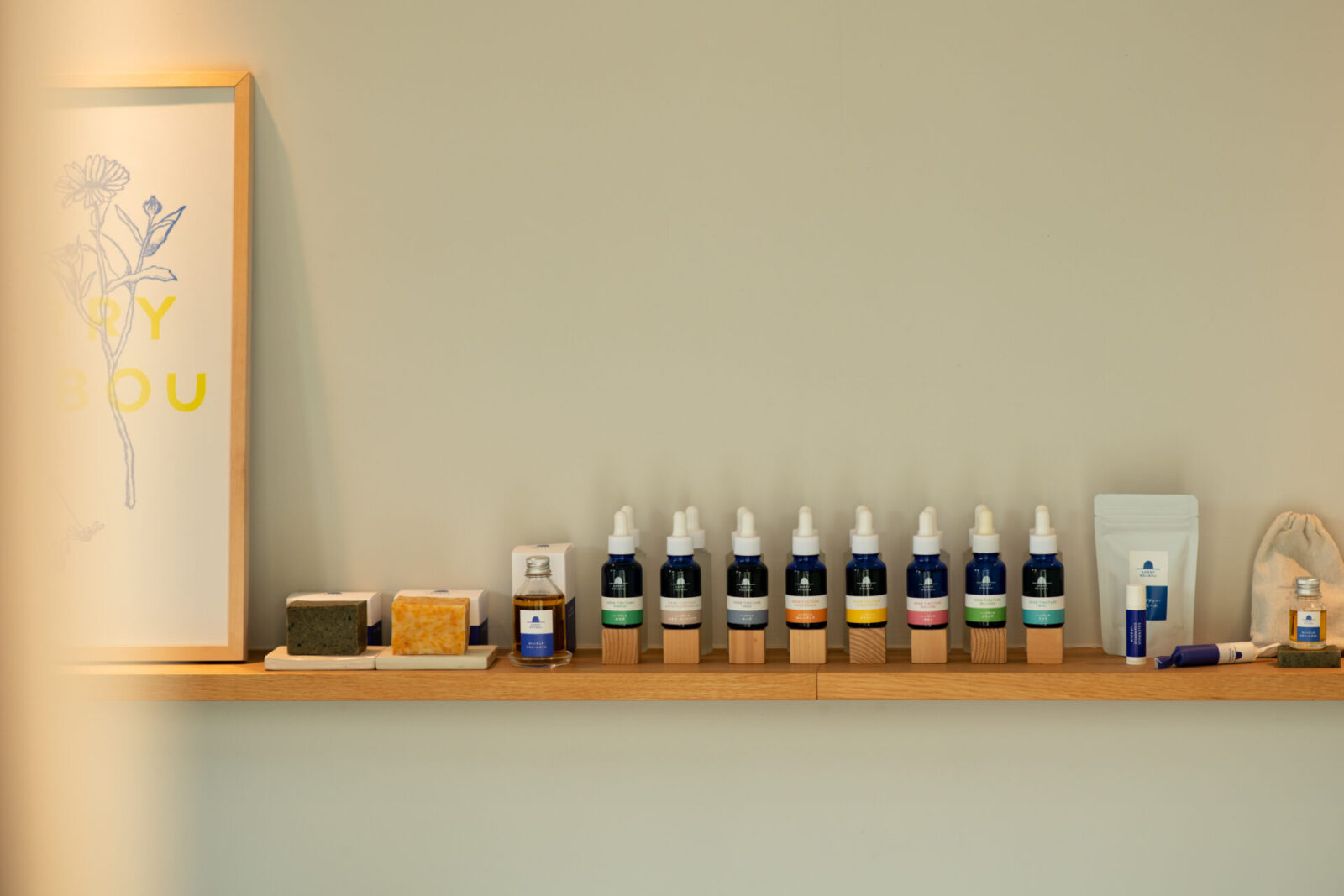
One obstacle is upkeep. Because the herbal tincture has no preservatives, it must be stored in the refrigerator and used up in about two weeks. Because of this, not many people become regular customers of their products. Yamada laughs as she says, “It really is a niche product.”
If they wanted to increase sales, they could make an original toner and sell it. Considering the quality of their ingredients, their products will surely sell well.
However, these two women choose not to.
“We don’t want to sell a water and call it toner. It costs a lot to bottle and ship them, and it uses a lot of man power and energy for distribution. After the 2011 earthquake disaster, I became more wary of using that kind of energy. When I think about how much waste and garbage is generated by selling pre-made toner, I begin to question whether making a big profit is really worth it.”
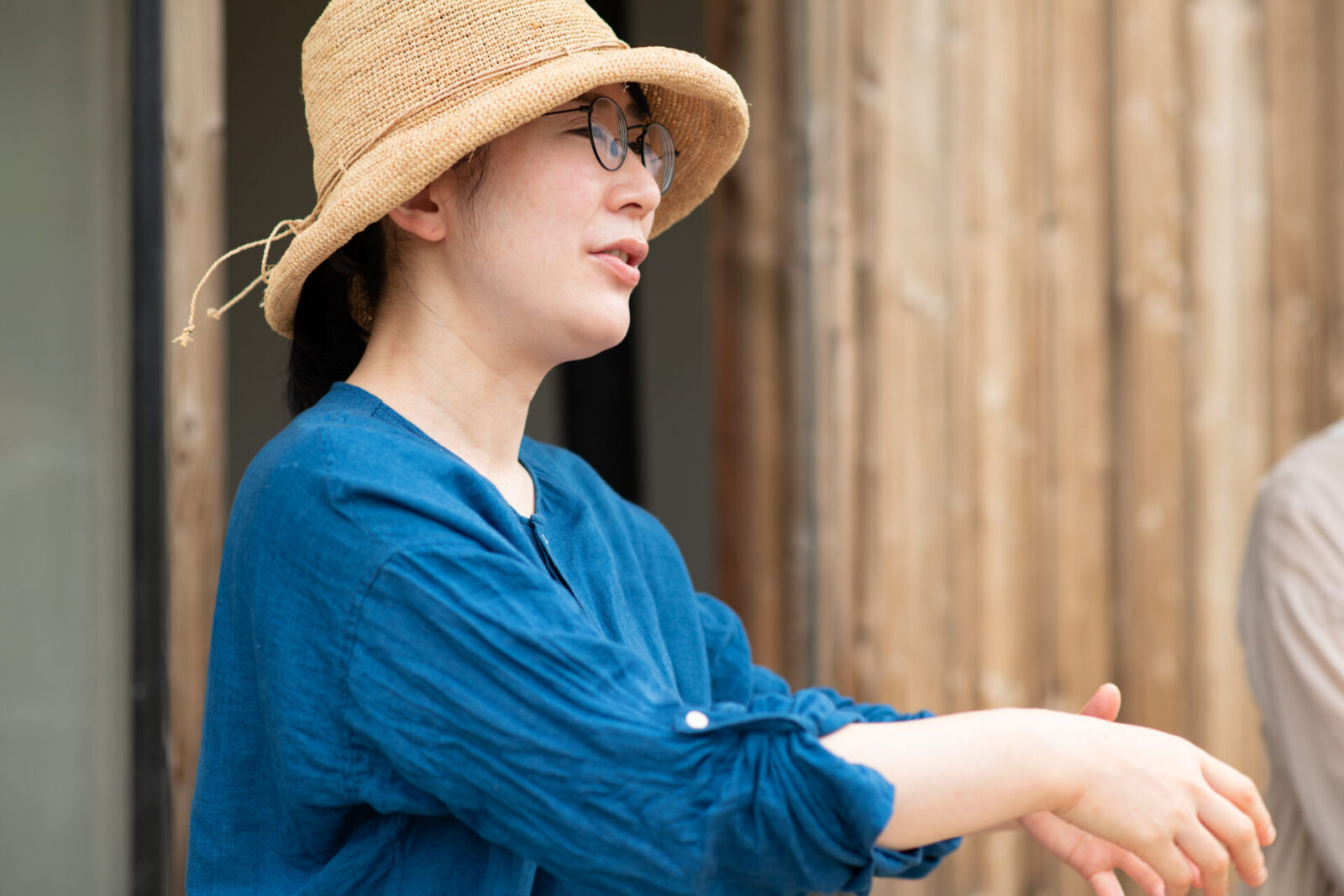
“Even if it is slowly and minutely, we would rather promote the use of tincture and suggest that people make their own safe toner.”
Before the coronavirus pandemic, not many people had heard of tincture before, but over the last year they say that the customer response has clearly changed and they have seen growth in orders on their online shop. The pandemic made many people rethink the way they work and live, and it seems the message that these two women convey is spreading to others.
Lives changed by the 2011 earthquake and tsunami disaster
Yamada is from Fukushima Prefecture and Komatsu is from Iwate Prefecture. They met through a mutual friend when Yamada was studying at a vocational school and Komatsu was attending university.
After graduation, Yamada started working at a cosmetics company and worked in the sales and marketing department. However, her atopic eczema symptoms worsened and she could no longer use cosmetic products that were available on the market. Out of necessity, she began making her own soaps and toner.
She studied herbs and tinctures on her own, and shared what she found to be effective with friends and acquaintances who shared similar skin problems.
It was during this time when the Great East Japan Earthquake hit her hometown.
The two women, who had stayed friends, contacted each other and checked on each other’s well-being. Yamada was from Fukushima, which suffered a nuclear disaster, and Komatsu was from Ofunato, which was severely damaged by the tsunami, so they both struggled for days with feelings of uncertainty and restlessness.
The disaster brought their friendship closer than during their student years, and they talked about things such as their future and how they wanted to live life from then on.
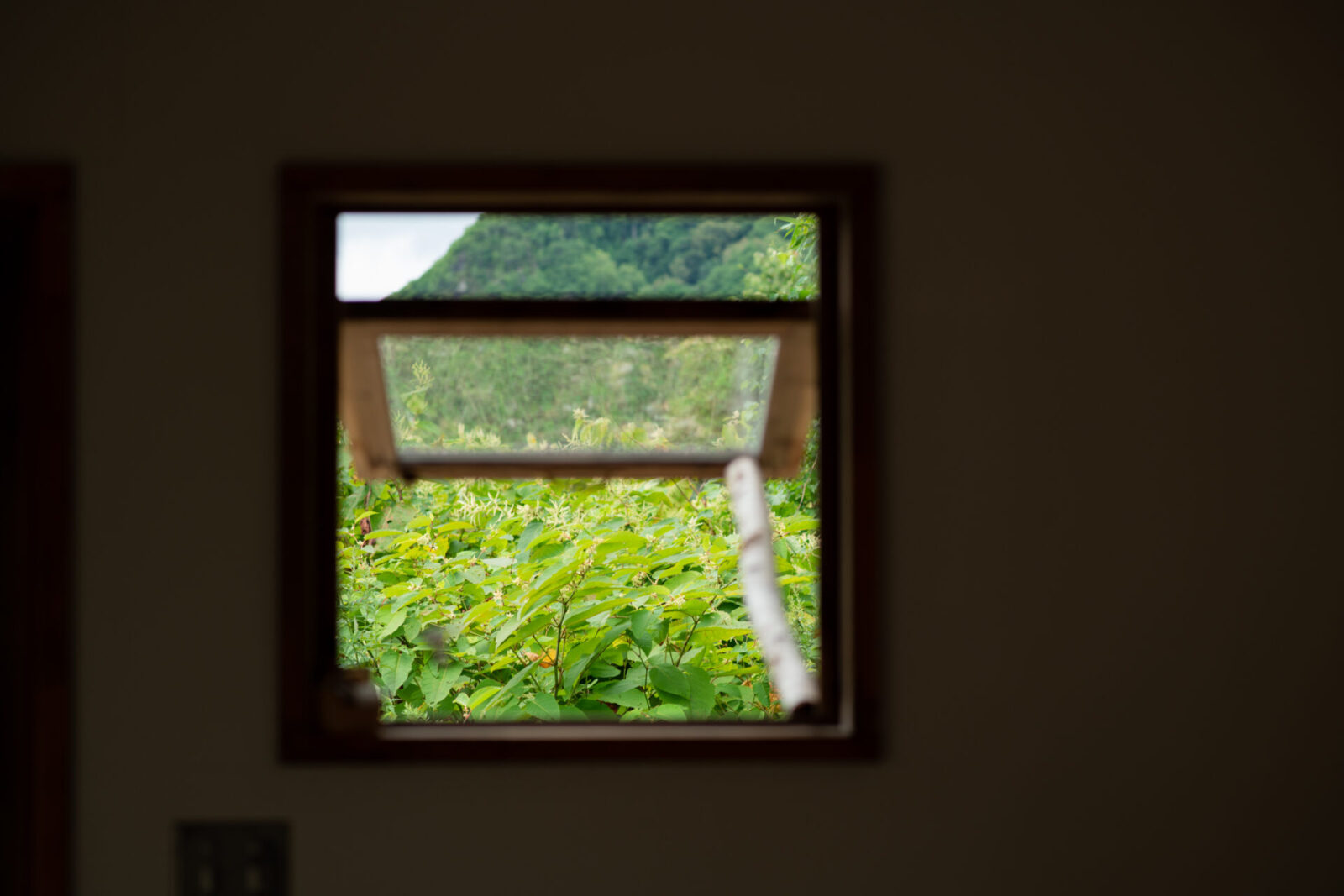
Yamada confided to Komatsu about an idea that was rapidly growing inside her.
“After witnessing the damages caused by the earthquake and nuclear power plant disaster, I had a strong feeling that there is a lot of value in making things you need in your life by yourself. I had a personal desire to make my own cosmetics, but I did not have the required knowledge or qualifications, so I asked Komatsu if she would join me on this venture.”
Komatsu had majored in material engineering and was working at a company in Sendai that analyzes water and food products. At the time, she had also acquired the certifications necessary to work on cosmetic production at her job.
Komatsu agreed to join Yamada on her new venture.
“After the earthquake, I started thinking about how everything can suddenly change in life and you never know what will happen. I thought about whether I wanted to keep working as a company employee or to try taking on something I wanted to do for myself. It was then that I thought, it’s now or never.”
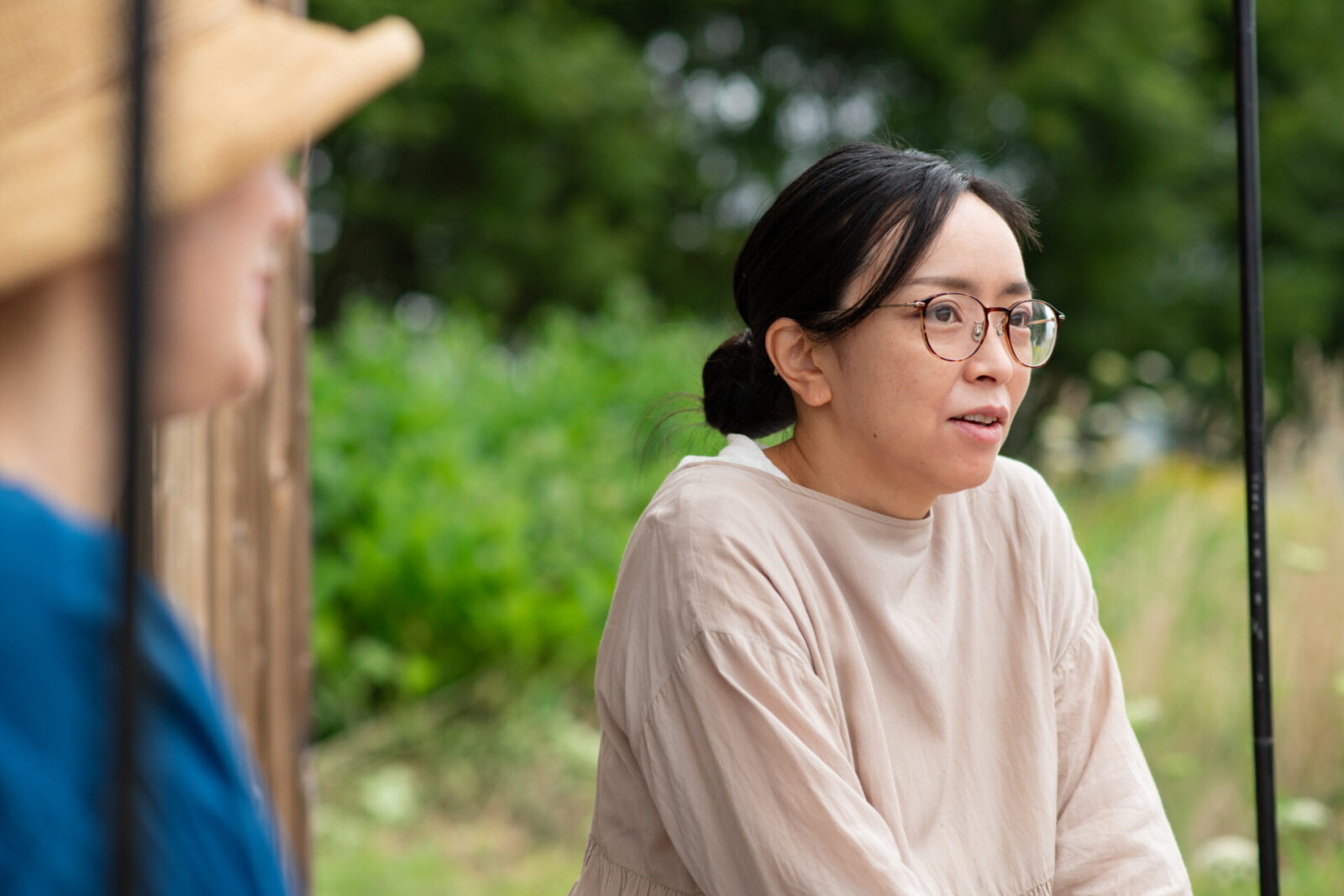
In search of suitable land for growing herbs
After the two decided on making cosmetic products using herbs, they began searching for a place to start their business.
Among several possible locations, they visited Ikeda Town of Nagano Prefecture and Shimokawa Town of Northern Hokkaido. Rather than choosing Ikeda Town, which is already a well known place for herb cultivation, they chose the small and quiet town of Shimokawa, which has a population of only 3 thousand people and is rarely visited by tourists, for two reasons.
One was because Shimokawa town, which is 90 percent forest, had been moving forward with plans on implementing renewable energy through the use of biomass from wood since 2001.
For the two women who had experienced the nuclear power plant disaster, they were drawn to the town’s commitment to developing clean energy, rather than relying on existing energy sources.
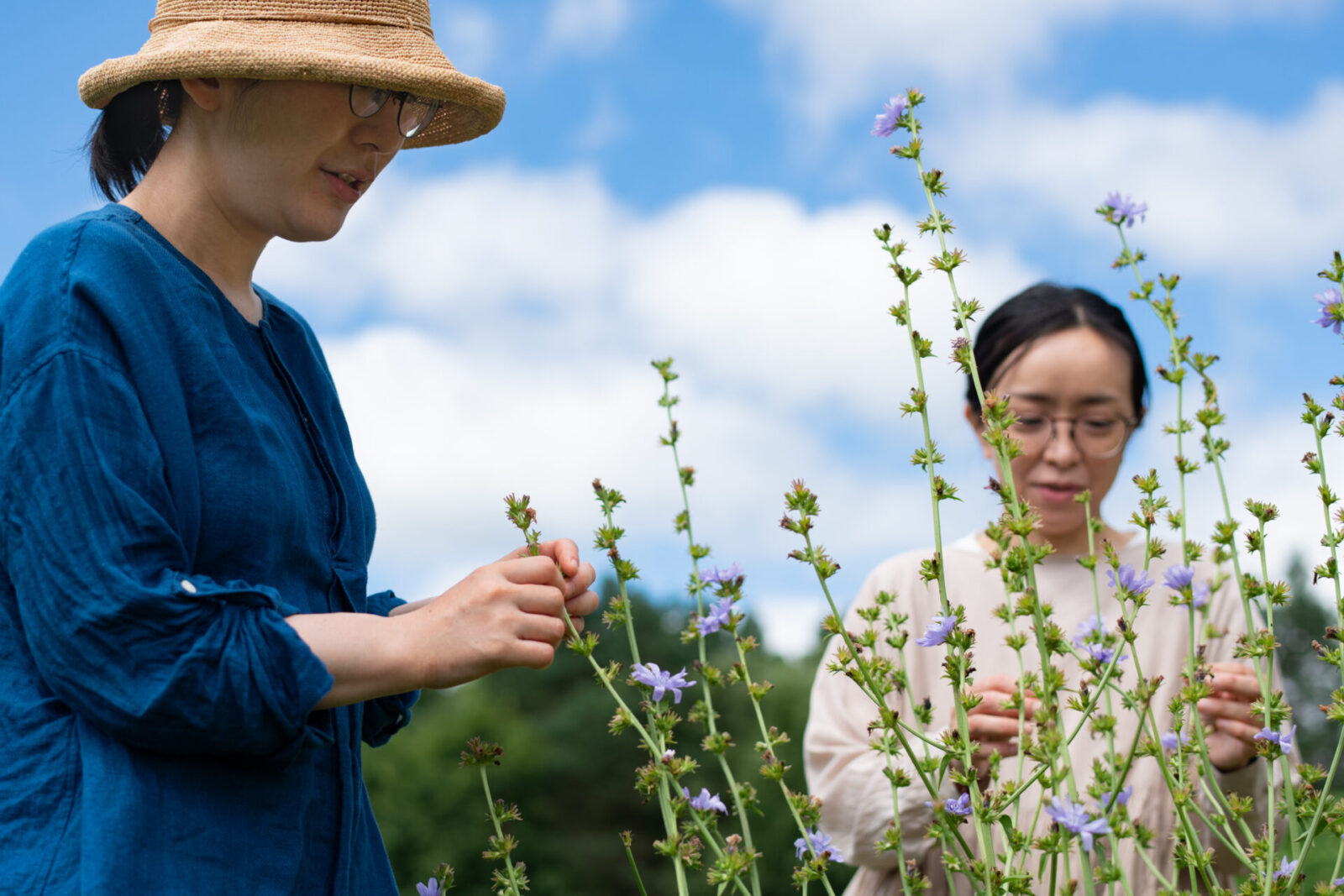
Another reason was the richness of the land in Hokkaido.
Yamada explained, “The plants become so big, in a way that is unthinkable in Honshu, so I thought it would be fun to cultivate herbs here. I don’t know why the plants grow so well here, but even the mugwort grows to be as tall as we are.”
The two learned that Shimokawa Town was looking for community-reactivating cooperator squad members, so they applied for the position to get a feel for life in the region. They were both accepted into the program and Yamada was assigned to work at the Station Cafe, Ichinohashi, and Komatsu at a shiitake mushroom factory that was run by the town.
The test of passing the winter in Hokkaido
The two moved to Hokkaido in the summer of 2014. The community-reactivating cooperator squad term was for three years, and it required working for four days of the week. While working at their respective jobs, the two rented an empty lot of land that was covered in weeds and began cultivating it.
Yamada explains, “There would be no point in living in Shimokawa Town if the herbs did not grow well here. So we decided to first try growing the herbs and started with planting chamomile seeds right away.”
“We had grown herbs in planters before, but I had no experience doing it outdoors in a field, Komatsu says.”
Surprisingly, neither had experience growing herbs on a large plot of land. They had come to Shimokawa Town for a three year term with no guarantee that the herbs would grow well here.
When I said to them, “That sounds pretty reckless,” they both smiled.
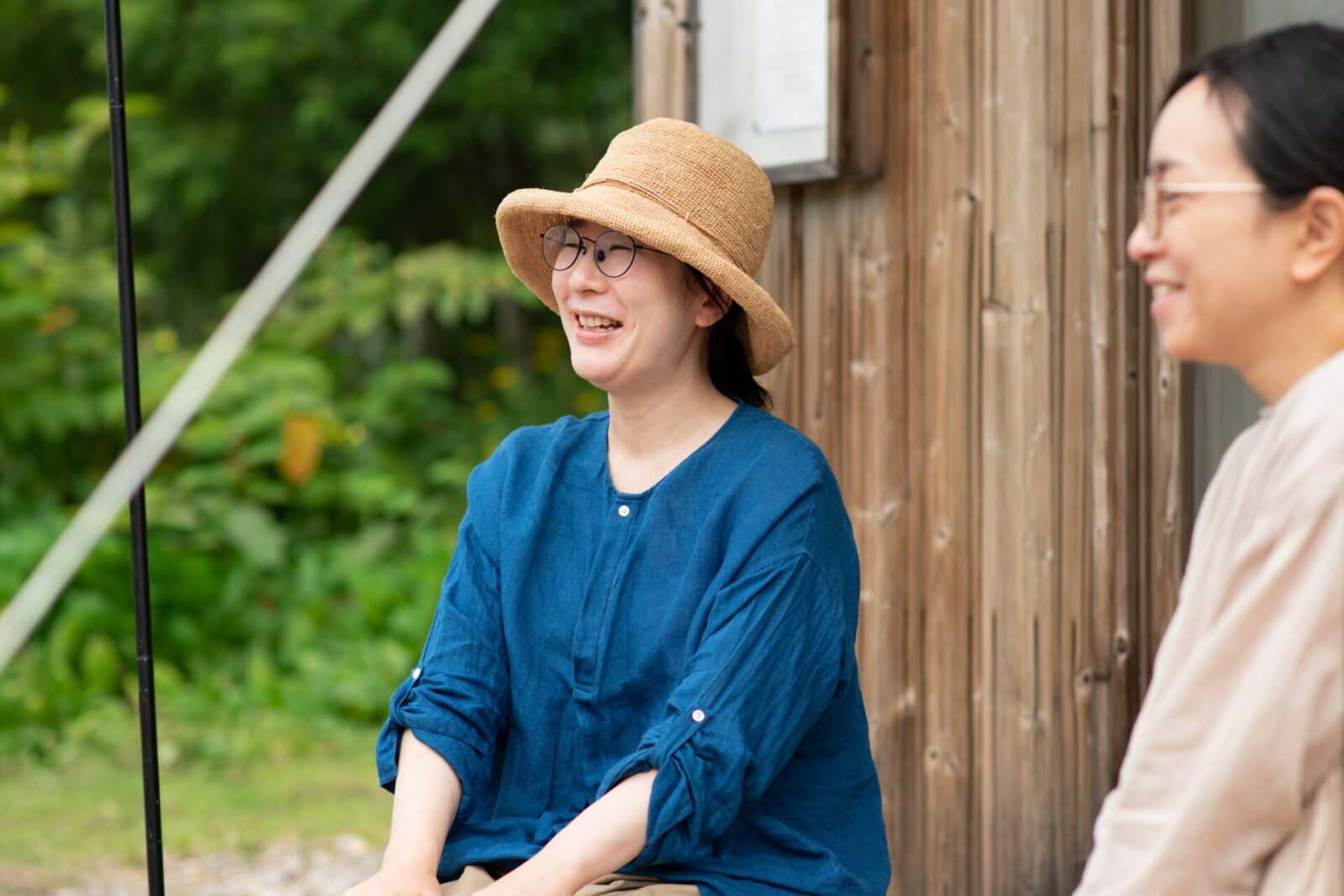
Yamada replied, “It really was. I surprised myself at my ability to take such action and risk at the time. I think I was looking for an outlet to let go of the emotions that had built up inside me since the earthquake and the aftermath. (laughs)”
Autumn arrives early in Shimokawa Town. After the Obon Festival in late August, it starts to become cool and in September it is already autumn weather. By October, it is late fall.
As the two worked at their jobs, they kept an eye on the growth of the chamomile plants everyday and were relieved to find that the herbs grew very well.
However, as winter arrived and the temperatures dropped to below 30 degrees Celsius, they worried about whether the plants would survive in the snow. If the plants died from the cold, they would have to start from seed again in the spring. As they worried about the plant, they did some research and learned that it is a herb that can survive under snow.
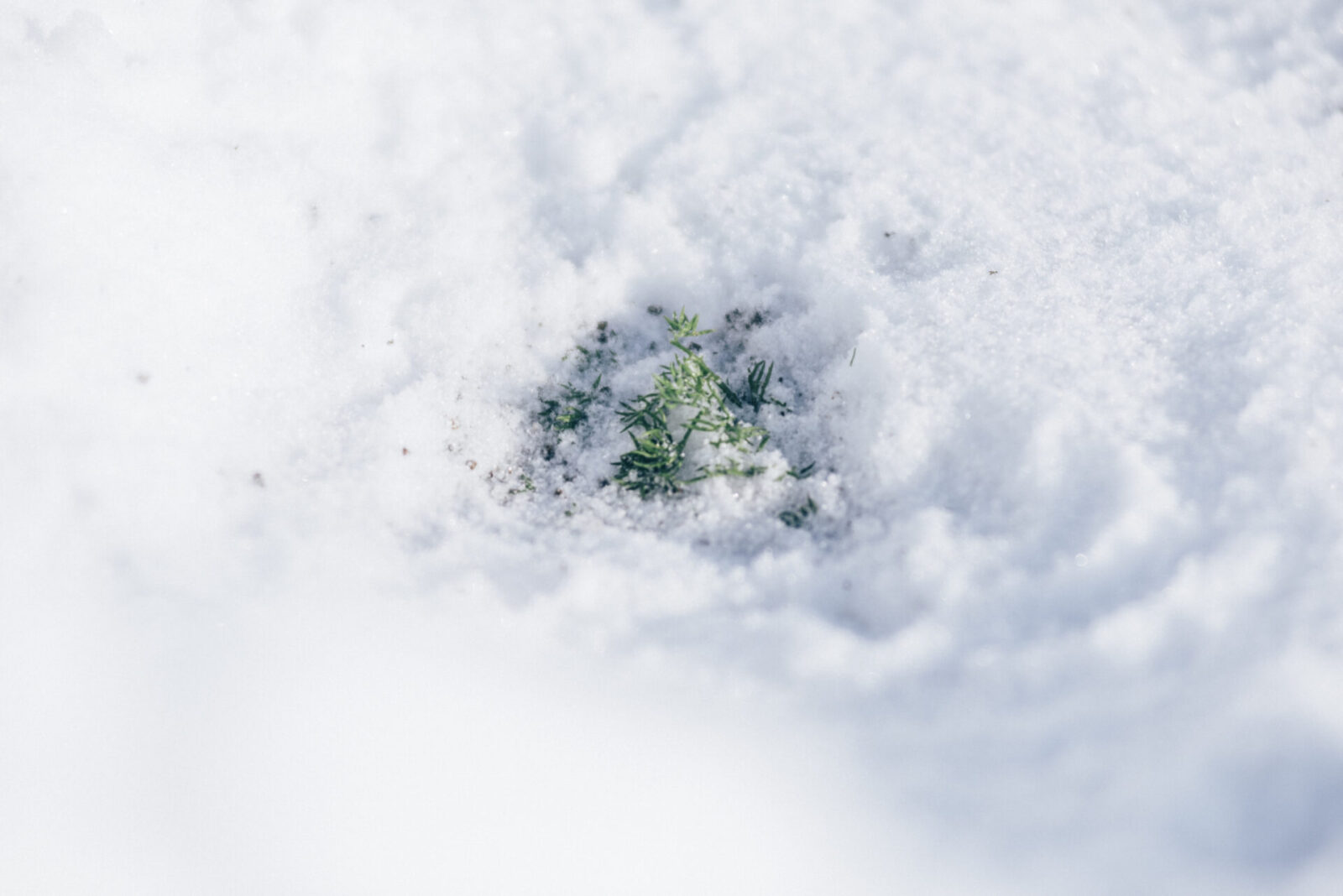
“We learned that there is a lot of carbon dioxide in the snow, and when plants are buried in snow, they store sugar in them. Sugar is an energy source, and because the roots are already in place, the plant uses the stored energy to grow after the snow melts,” Yamada says.
When Komatsu saw the vigorous chamomile plant come back to life in spring, she said she was very moved by the plant’s vitality and the power of life in nature.
Herb tinctures that harness the power of plants
Working four days a week took more of their time than they had expected, and for the first two years, they only had time to grow a few types of herbs. They did not have the time to plan how to develop their business in the future.
However, after the three year term ends, they would be without a job. The two decided to open a workshop in Shimokawa Town and began preparations right away, including applying for a town subsidy to fund the development of their business.
They took time to reevaluate their goals and their possibilities, and their conclusion was to produce domestic herb tincture.
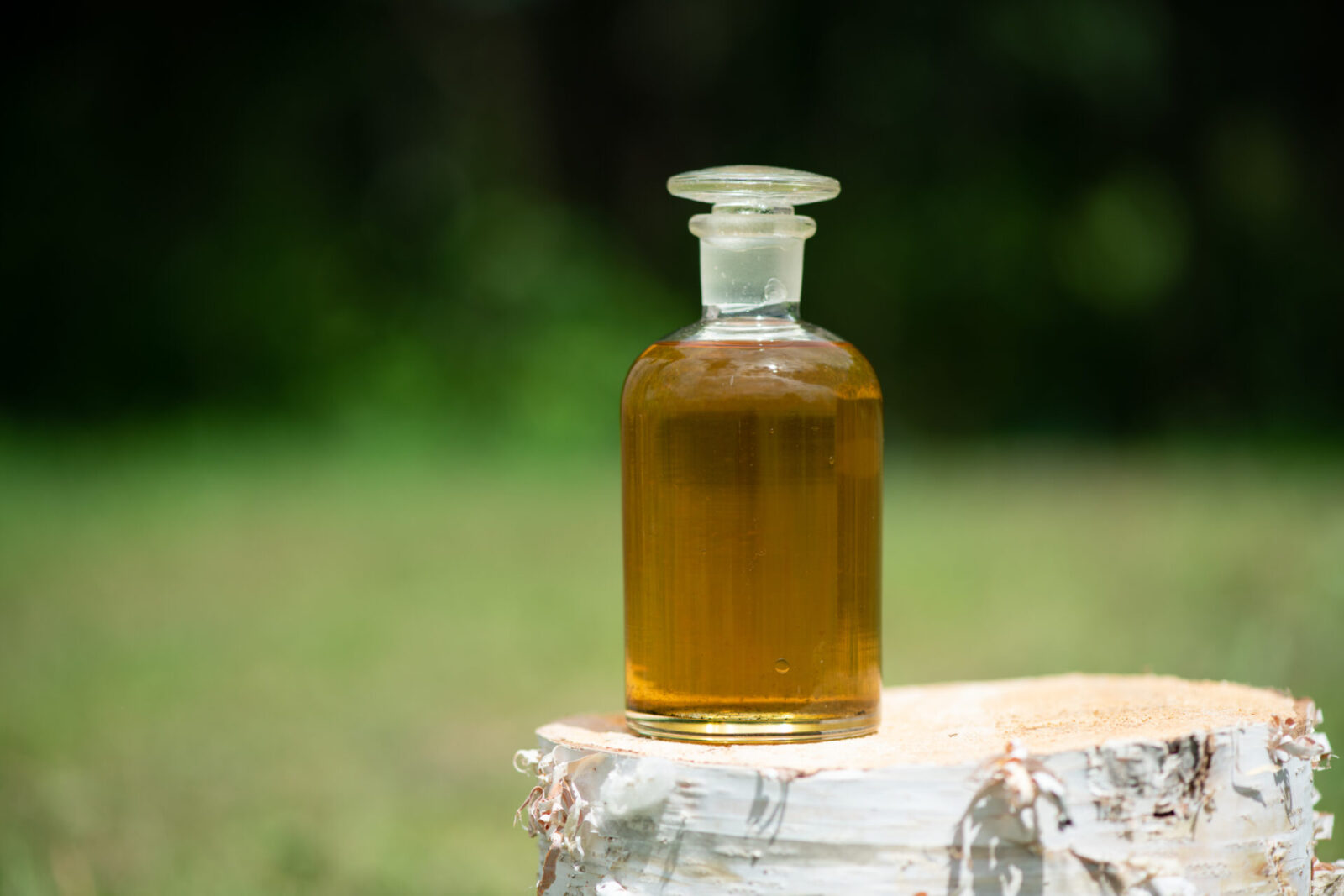
“We thought that the best way to harness the power of plants was through tincture. I began looking for ethanol, which is the base ingredient for tincture. I found a company that made ethanol for drinking that was produced using domestic sugarcane, and they agreed to sell to us in small batches, which is what we needed.”
“We can confidently say that our products are safe to use because they are made with organic herbs, and this is something that big corporations cannot claim.”
In April 2017, they finished their community-reactivating cooperator squad term and founded their company that same year. During their term, they had worked with the local residents to shovel snow and cut grass, and lent their ear to the local concerns. When the time came for them to start their company, they had the strong support of the local community.
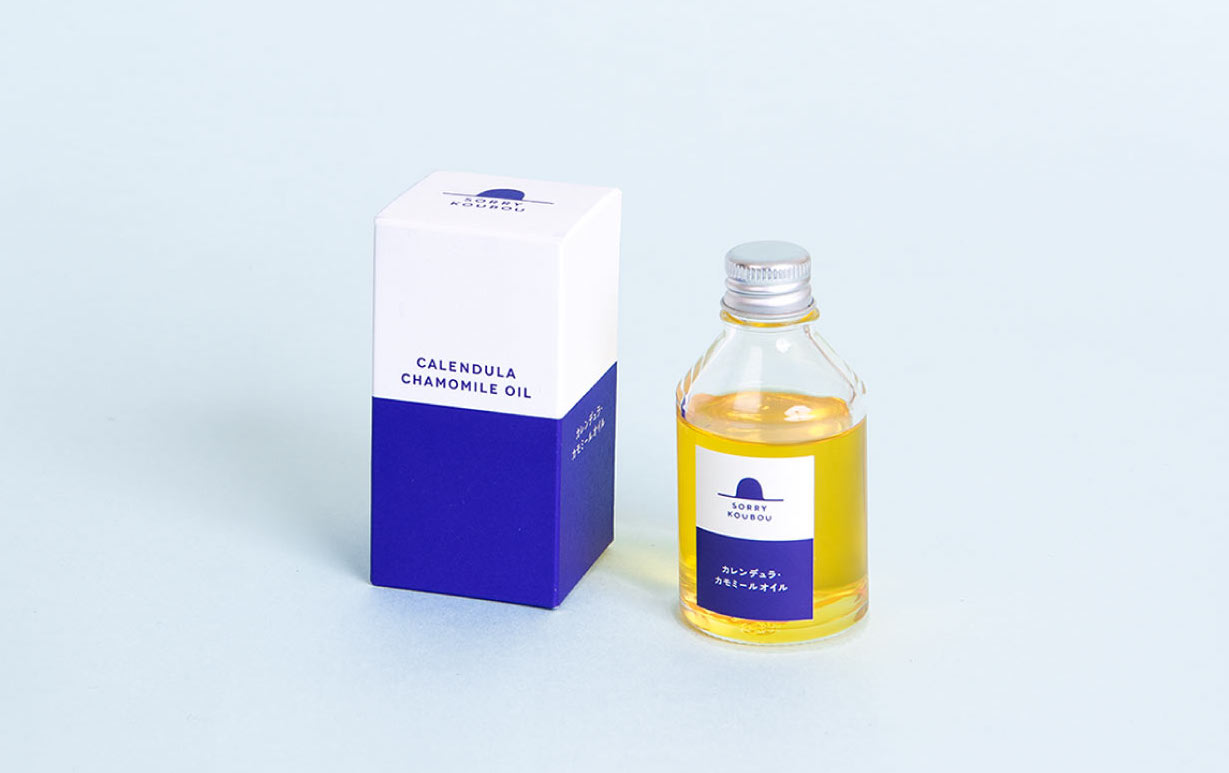
The name of their company SORRY KOUBOU came from the owner of a pizza restaurant that they worked at to save money to open their business. The owner said to them, “How could you leave me and go somewhere so far away? You should name your company Sorry Koubou. Just apologize from the start.” The two loved the idea and kept the name.
The year after they started their business, they built the “cosotto,hut” along a main road. The wood used to build the hut was donated by the chairman of the local chamber of commerce who runs a lumberyard in Shimokawa Town.
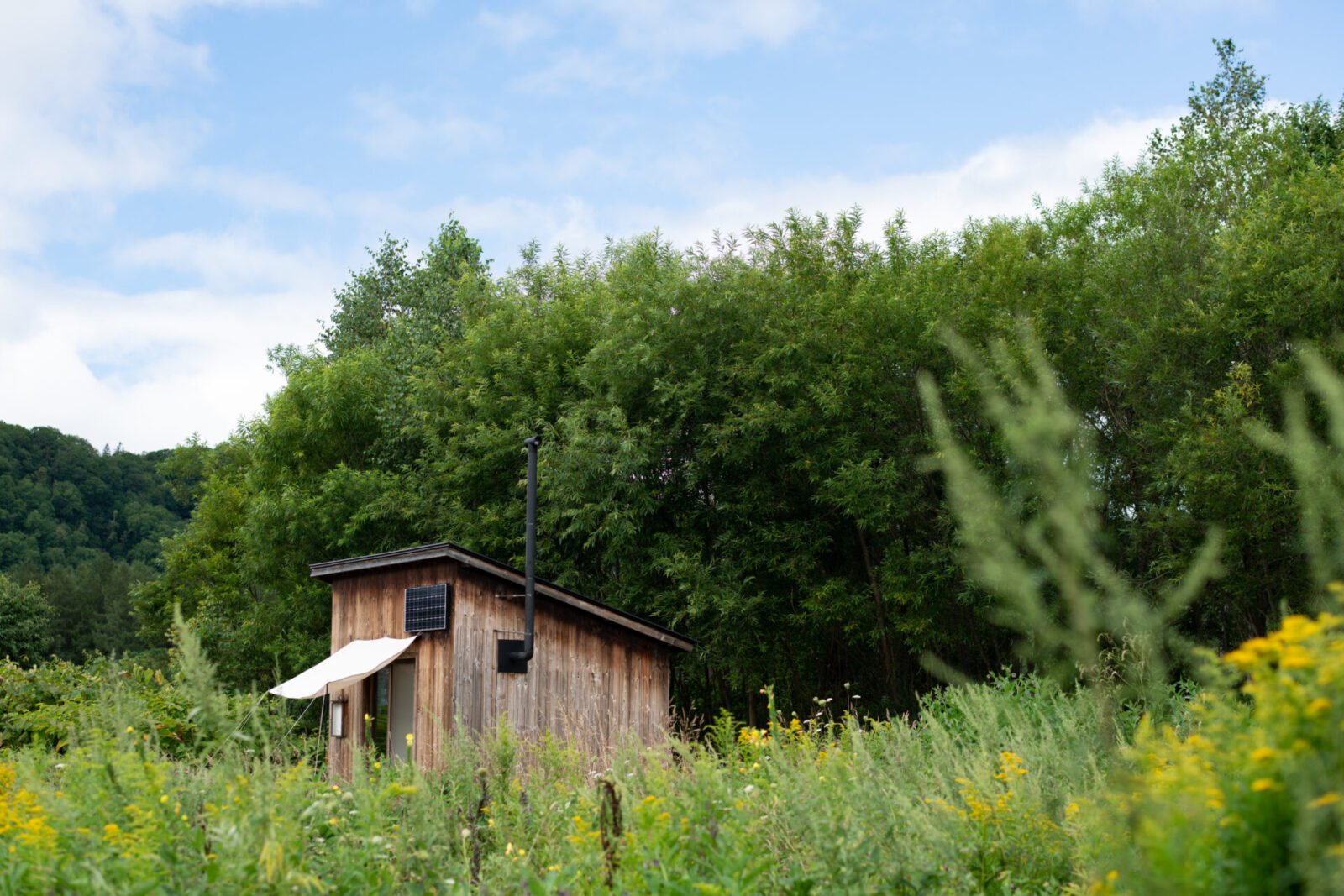
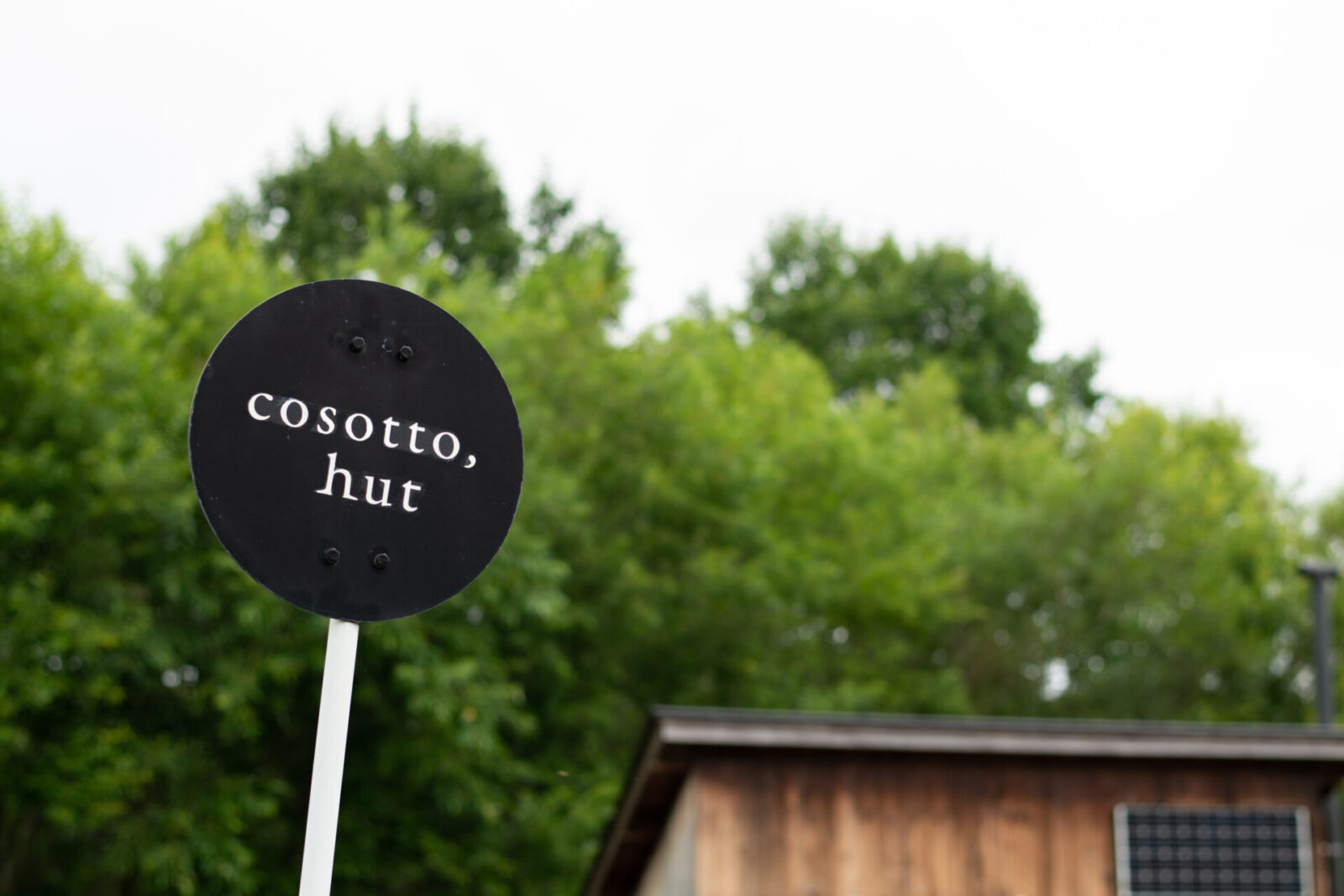
Although the two were amateurs in herb cultivation, the Research Center for Medicinal Plant Resources of Hokkaido, which is an independent administrative agency located in the next door town of Nayoro, was a reliable and helpful resource.
The research center was established for experimental cultivation and research of northern medicinal plants, and when the two consulted them about the herbs they wanted to grow, an expert gave them detailed advice. They even gave them some herb seeds to start off with, helped research the origins of plants they were interested in, and provided various support on their venture.
They also got acquainted with an organization next to the research center that produces, sells and wholesales hatomugi, a Japanese medicinal crop, so they were able to purchase this ingredient from them.
Komatsu says, “We were lucky to have these facilities and organizations near the town in which we started our business.”
Looking back, the three years of their term in the community-reactivating cooperator squad was a period for them to sow the seeds of their future. Because they were able to build connections within the local community, the seeds of SORRY KOUBOU were ready to sprout successfully.
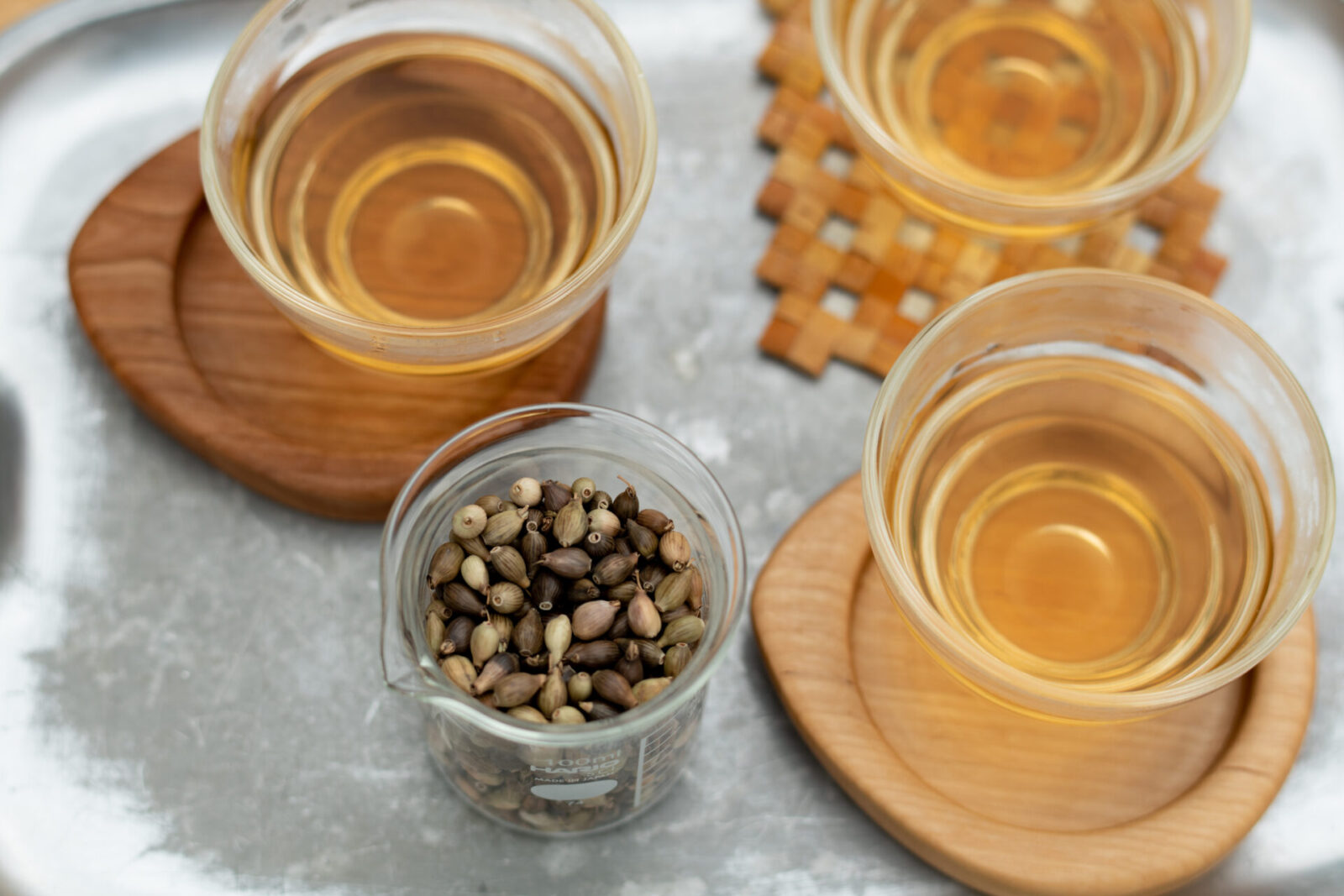
The most grueling yet relaxing place
The field where they grow their herbs is surrounded by forests where squirrels and hares can be seen running around. One may imagine their daily work to be serene and leisurely, but the truth is far from it.
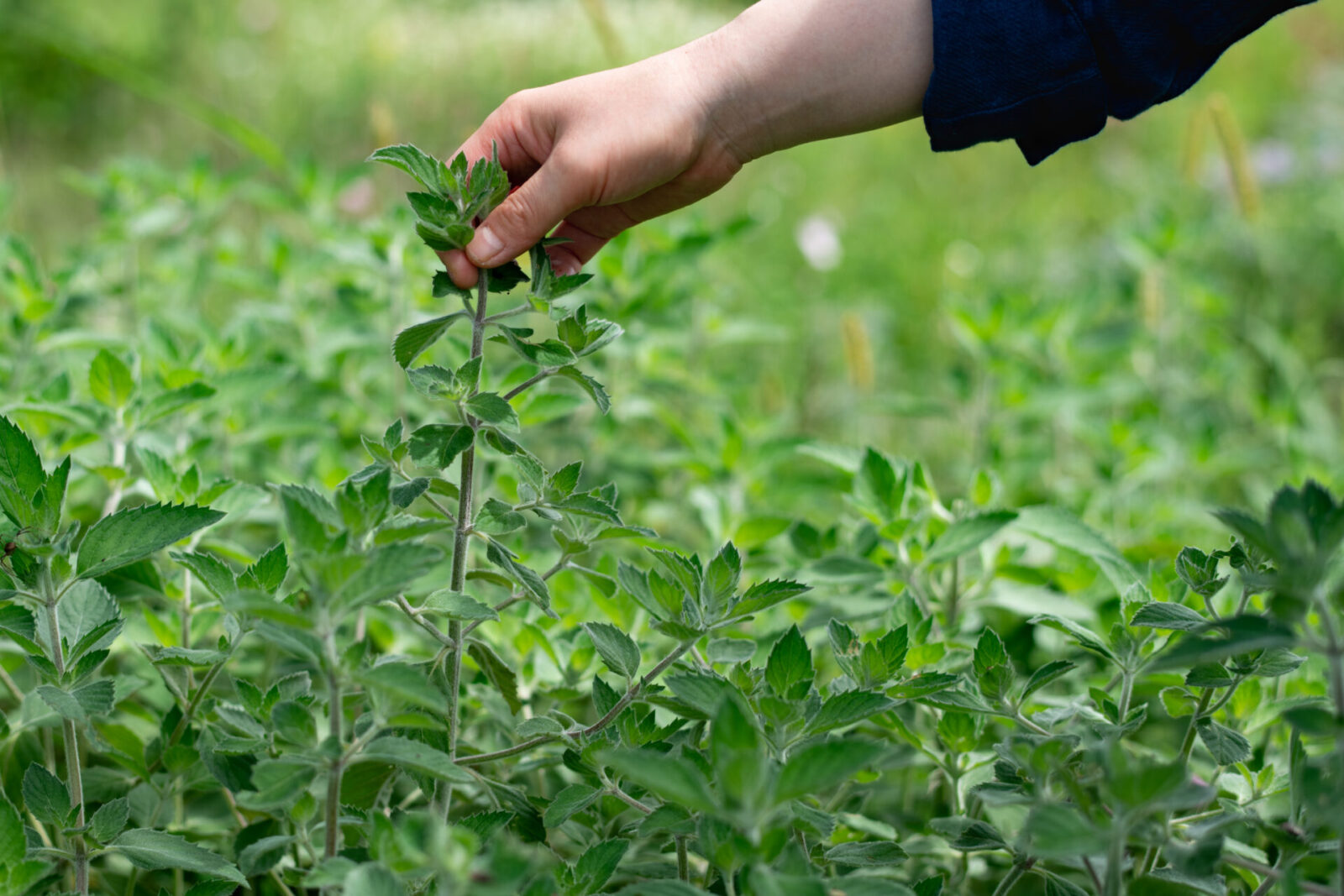
They plant the seeds of the herbs, take care of them so they don’t wither, and harvest them with care. The herbs are dried, crushed, and soaked in ethanol for about a week. The product is finally filtered and bottled for sale. They are then sold in stores and at events around Japan.
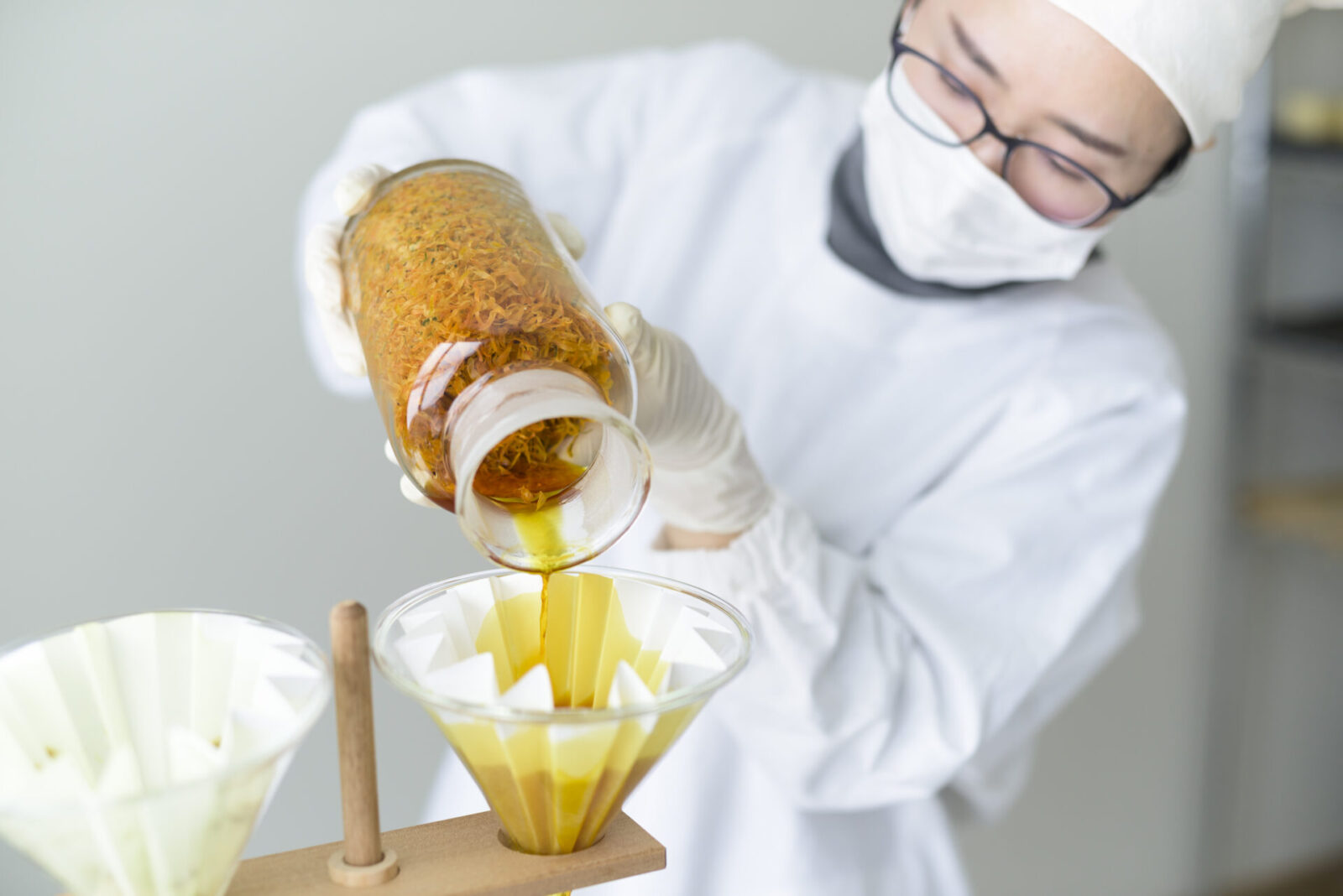
When they receive an order through their online shop, they package the product for delivery. They are currently working on developing new products and are always busy because they do all the processes themselves. At times, they become overwhelmed and occasionally argue with each other.
However, their commitment to the herb tincture cosmetics is filled with the many thoughts and emotions that they shared, and this keeps them together.
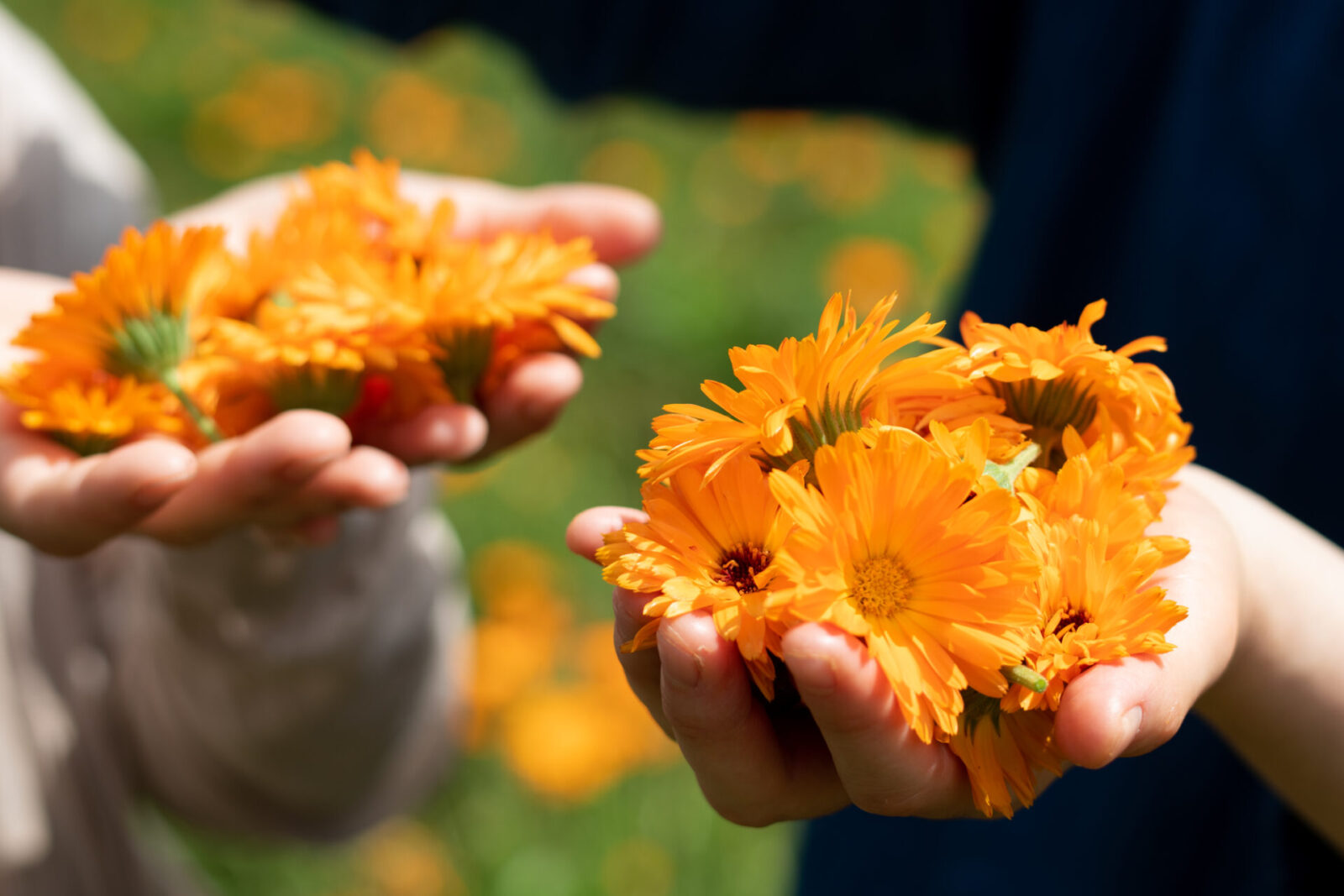
The two say that they use lotion they make from calendula tincture, which has anti-inflammatory properties, to treat the sunburn they get from working in the fields. They also use toner made with mallow to moisturize their skin in the dry winter months.
Yamada, who suffered from atopic eczema, smiles happily as she says, “If we stop making our products, no one will suffer more than me. I found it very rewarding to be able to use the products myself and be happy with the results. Moreover, it is my most trusted friend who is making the product. That is the best feeling.”
The time they spend in the herb fields is also important to them. They describe the farm work to be “very hard physical labor” and “grueling.” It is far from being leisurely.
However, the herbs bloom in various colors of orange, white, blue, yellow, pink and purple. All as if to reward their hard work. When they take a moment to rest in the fields, they are awestruck by its beauty.
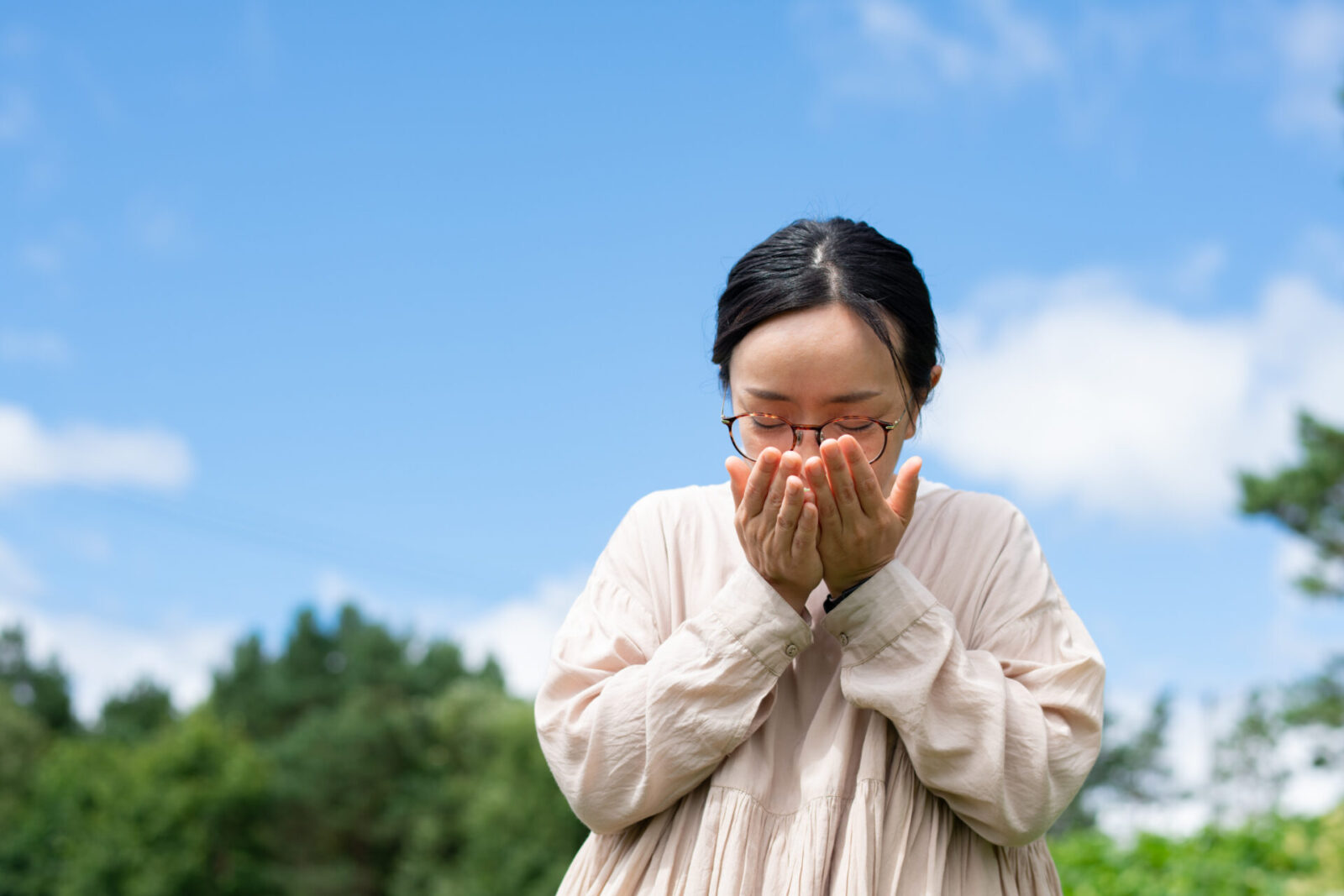
Komatsu says, “I enjoy taking photos of the pretty fields and posting them on social media.” Yamada teases Komatsu about this as she lovingly looks out into the fields.
Yamada continues, “There are a lot of flowers that bloom in July and it is really beautiful when they are in full bloom. Sometimes I feel like I am in heaven. I feel happy when I am alone in the field of flowers in full bloom. The hardest part of this job is working in the fields, but it is also the most relaxing place. It is difficult to put into words, but there are moments I feel so happy that it gives me chills.”
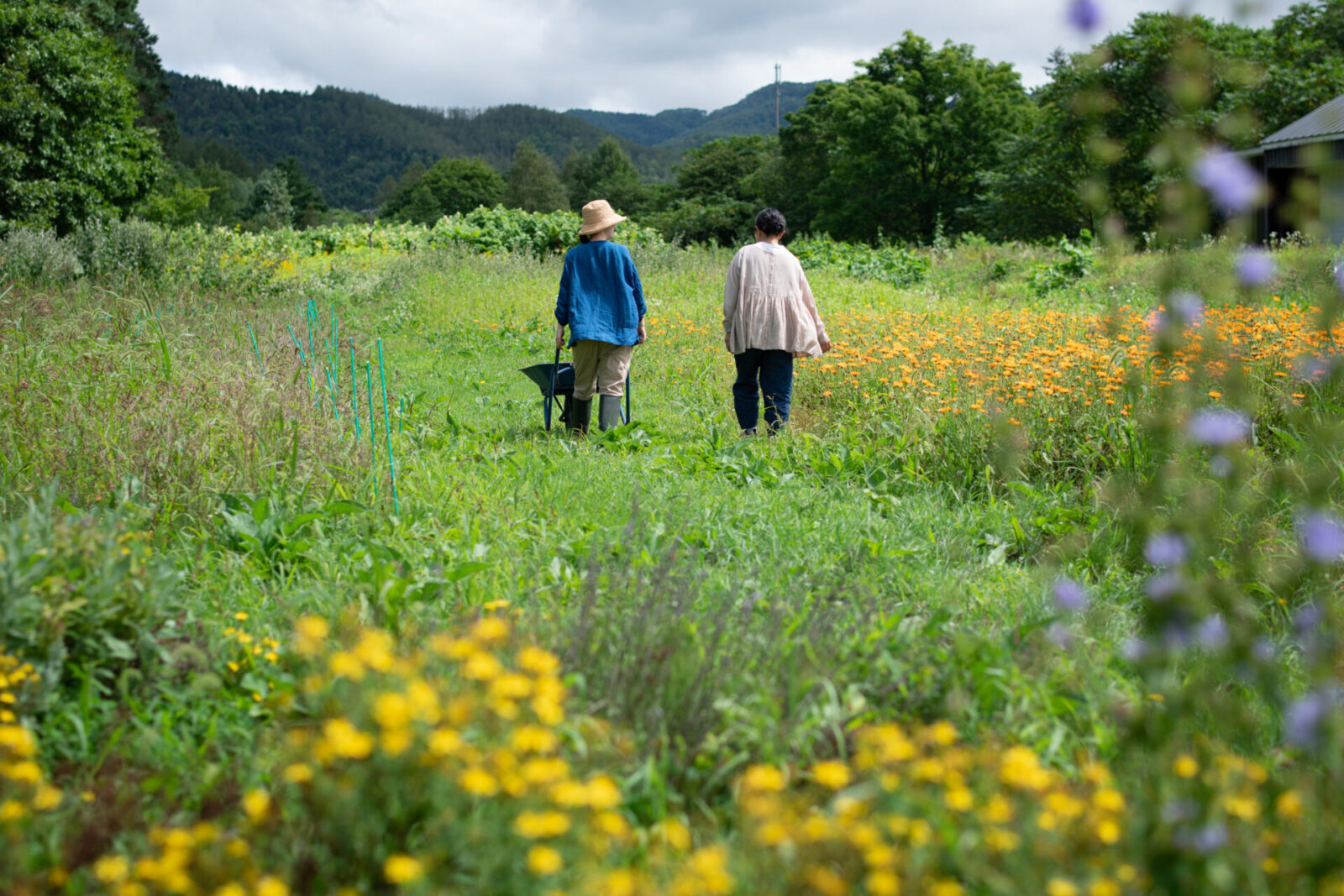
Although they are new to Hokkaido, they have developed their roots here and have settled in nicely. It is clear that they will continue to work shoulder to shoulder as they grow the herbs to make their original and unique cosmetic products.
Photo: Yuko Kawashima
Translation: Sophia Swanson
Editor. Born and raised in Kagoshima, the birthplace of Japanese tea. Worked for Impress, Inc. and Huffington Post Japan and has been involved in the launch and management of media after becoming independent. Does editing, writing, and content planning/production.
